|
| Author |
Message |
fixamerica
Member
|
# Posted: 27 Dec 2018 20:22
Reply
I have been doing research on affordable alternatives to typical concrete post and beam cabin foundation options. I want to be able to have a good foundation with minimal labor and costs, mostly because I am building this cabin by myself with no help in a remote area of New England near the Canadian border. I discovered this product that is designed for building deck foundations. I called the manufacturer and they said that this would indeed work for a cabin foundation and that others have used it before for sheds and cabins. I was told that frost heave is not an issue with this product because there is nothing to "grab onto." Anyway, since this is a non-traditional idea, I wanted to see if anyone had some opinions to share as to whether or not they think this would work as a reliable foundation? Cabin will be 20x30.
Product Site: https://ozcobp.com/product/t6-700-5-12-square-oz-post-anchor/
Thanks
|
|
fixamerica
Member
|
# Posted: 3 Jan 2019 11:01
Reply
no one replied, so I guess I will have to figure it out for myself like everything else in life! I thought this forum was for people to help each other!
|
|
Absolutely
Member
|
# Posted: 3 Jan 2019 12:13
Reply
I am far from an expert but the item you linked appears to be designed for fence posts. To support a building a flat load bearing surface below the frost line is required. This product would be more appropriate.
I, like many (most?) here have worked alone in remote locations but sometimes there are no shortcuts to doing things, unfortunately.
|
|
snobdds
Member
|
# Posted: 3 Jan 2019 13:51 - Edited by: snobdds
Reply
Yea I wouldn't use that post anchor for a foundation. It has very low lateral shear resistance, it is fine for a fence post, but not a structural application.
Look how footings are made, with a wide foot print. That post comes to a point. It would worry me, but that's me.
I had a engineer plan these out for me. A box with 3x3 foot print and then a sonotube coming up through the middle. The sonotube does not touch the ground, it starts half way through the box. It has rebar throughout. I would sway you to this design more that the post base.
|
|
creeky
Member
|
# Posted: 4 Jan 2019 10:45
Reply
You can search this site for info on foundations. Lots of topics.
What you link to is a post anchor. There are many of these. Available in every big box store. So linking to a specific anchor in your first and only topic post... I'm sure you understand our lack of enthusiasm.
|
|
toyota_mdt_tech
Member
|
# Posted: 4 Jan 2019 14:00
Reply
Quoting: fixamerica o one replied, so I guess I will have to figure it out for myself like everything else in life! I thought this forum was for people to help each other
Holidays, maybe no one saw it, a bump to move it back up, but also, you catch a lot more flies with honey than you do vinegar.
Now me, I would use a full footing stemwall just so you don't have to deal with varmints. But otherwise, columns with footer and protection under the floor to keep varmints out.
|
|
fixamerica
Member
|
# Posted: 4 Jan 2019 18:33
Reply
thanks for everyone who replied. I used to be a socialist and I am learning to become more self reliant and improve my attitude. I need to be more patient. 
|
|
rockies
Member
|
# Posted: 4 Jan 2019 19:42 - Edited by: rockies
Reply
The problem with sonotubes (or the Bigfoot system) is that it still requires concrete. For example, a 10" diameter Bigfoot tube 6' long requires 3.27 cubic feet of concrete (or eight 60 lb bags of concrete).
You also have to rent a mixer, get the water, get the mix just right, haul the concrete to the hole, have rebar installed, pour and level the tubes, etc.
If you can, use a helical pile foundation. A small machine comes out to your site and screws the piles into the ground in one day. A gauge on the machine tells them when they reach the proper bearing capacity for the building.
This company is based in New England.
http://solidearthtech.com/
|
|
|
Aklogcabin
Member
|
# Posted: 4 Jan 2019 19:48
Reply
Hello fixamerica. Don’t get discouraged. I built a 16’x24’ 3 sided log cabin with 10’ side walls miles off the road. In Alaska. There are pictures of it somewhere around here. It can be done. You can do it. For my foundation I used some treated , some type of creosote looking stuff but not creosote, cedar utilities poles that I got from a company that does overhead power lines. Cut to 9’ lengths. I had to freight all my stuff in the winter using snow gos. Many thousands of pounds. As there are no road and too wet from tundra in the summer.
I read where folks write that if you bury posts that
they will rot off . Has not been my experience after 10 years in the ground with on effect at all. Ground is 4’ of overburden from several million years of plants decaying over cobble. You can get the sub surface geo stuff from the US geological service. USGS. I have seen this on many other cabins . If they did ever need replacement I would probably do the same thing . Way past my worries .
Some folks will wrap felt paper or visqueen plactic around them. To help with the supposed effects of frost hydrolicly pushing the posts up. I have heard of both but never any evidence it mattered , as in cabins that have been shifted from frost. These are cabins. You may want to go look at the nearby utility poles and see if they have
been pushed up by frost. They don’t use any wrap either.I went down 4’ with a gas powered portable post hole digger. Had to chisel a bit with a long steel bar . Called some kind of a bulls thing I think. Ask around. I backfilled with pre mix ready to mix concrete. Go 4 inches or so above ground level to keep any water from going down next to poles.
I cut my poles leveled 4’ from the ground and then cut a shoulder in them to accept a 4â€x 12†wood beam I got from my log supplier. These were bolted through the beam and post with a 1/2†galvanized bolt with large washers.
I ran 3 rows, with posts 6’ or running length and 8’ on width.
Mostly have a sense of humor. Remember that most folks want to help and we all have our own reasons. And always remember that there is no such thing as a bad question.
Happy New Year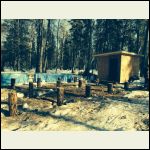
Foundation posts
| 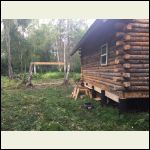
Back of cabin
| 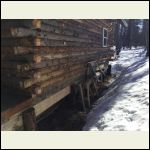
West side
| 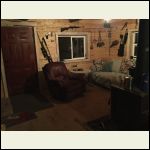
Fun side of the cabin
|
|
|
Aklogcabin
Member
|
# Posted: 4 Jan 2019 19:56
Reply
Of course I could not have done anything without my best friend and partner. My beautiful wife.
|
|
socceronly
Member
|
# Posted: 7 Jan 2019 19:38
Reply
20x30 is a pretty good size.
I am building a 9x12 and I wouldn't touch those things.
I used them for a small low (18" high) deck in Vancouver where frost isn't much of a concern.
What is your frost line?
Skids on gravel would be better than posts of any height sitting on those.
|
|
beachman
Member
|
# Posted: 8 Jan 2019 13:51
Reply
I would second the Screw piles advice. I have seen them used in cabins on this site in remote and frosty areas. I used them on a large deck and no movement for three years now. Heavy clay soil where frost can go down several feet.
|
|
Dekagoldwingers
Member
|
# Posted: 10 Jan 2019 01:29
Reply
We used screw piles, a brand called techno metal post out of Quebec. We have a 20 by 30 cabin on glacial till with a 4’frost line. All posts are screwed below the frost line and rated by torque to support the weight required. The drive unit was quite small brought in on a trailer behind a pickup. 2 days to get them all in with welded on saddles then off to the races with glue lams and I joists. Engineered and acceptable to build8ng Authority.
|
|
gwindhurst
Member
|
# Posted: 12 Jan 2019 15:17
Reply
My first post/reply- I've been reading many posts and researching for some time however... I'm no expert, merely a self proclaimed Jack of All Trades, Master of none... Anyway, I have property in VT just East of Ludlow where I'm planning a 16x20 cabin build beginning hopefully sometime this spring/summer. I plan on using a compacted gravel pad (removing organic material first), then solid concrete pads followed by solid block piers (similar to photo below however beefed up more). Should any heaving and settling take place unfavorable, the cabin can be jacked up and readjusted back to plumb/level/square. The key will be to keep water away from the piers by careful site planning and water run-off control. Good Luck with your build. I look forward to seeing what you decide and watching your build. Hopefully I'll be sharing my experiences soon enough... PROST!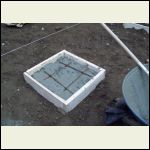
Reinforced Pad
| 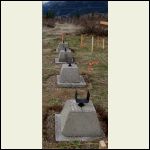
Adjustable Pier
|  |  |
|
|
|

